
Arabic Greek (Αραβικό Ελληνικό)
Arabic Greek (Aravikó Ellinikó) is adaptation
of Arabic script for writing Greek language. It is designed
by Mohammad Shakeb Baig. This script is designed for Modern
Standard Greek. With addition of some diacritics, it can also
be used to write Koine and Ancient Greek languages.
Notable Features
- Type of writing system: vocalized abjad
- Direction: right to left in horizontal lines
- Used to write: Modern, Koine and Ancient Greek.
- As Greek is an Indo-European language, the script is derived from various languages of this family natively written in Arabic script
- Major Indo-European languages which use Arabic script prefer Nasta’liq calligraphy. Same calligraphy is preferred for Greek
Arabic Greek alphabet
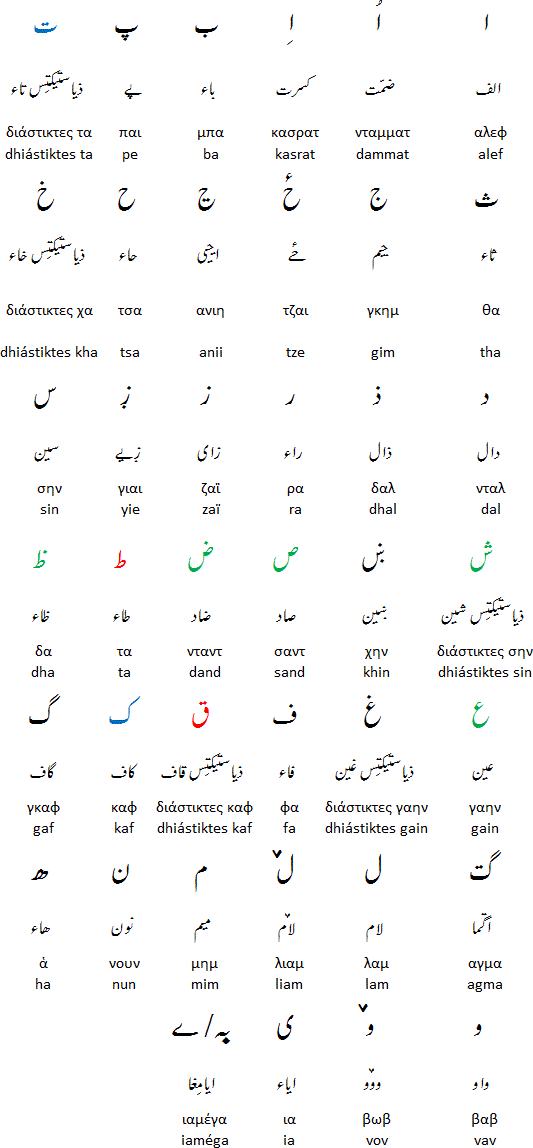
Notes
- Red coloured letters are used only in names (and words which are generally capitalized). Their blue coloured counterparts are used elsewhere. Example: ذیمیطریس (Dhimítris) but آوتُكیڃیتُ (avtokínitó). This is done because of historic preference to red letters for transcribing Greek names in Arabic.
- Green coloured letters are used only in loanwords from Arabic script languages.
- Letter iamega in its isolated, initial, medial and final forms is written as ے, ېـ, ـېـ and ـے respectively.
- Other than these symbols, shaddah and hamzah are also used:
- Shaddah is used to mark gemination of Ancient Greek. It is marked regardless of pronunciation. Example: پُڵّی (πολλοί, polí).
- Hamzah is mainly used as vowel separator. Example: سادوئیح (sánduïts).
- Punctuation of Urdu is used.
Pronunciation
Consonants
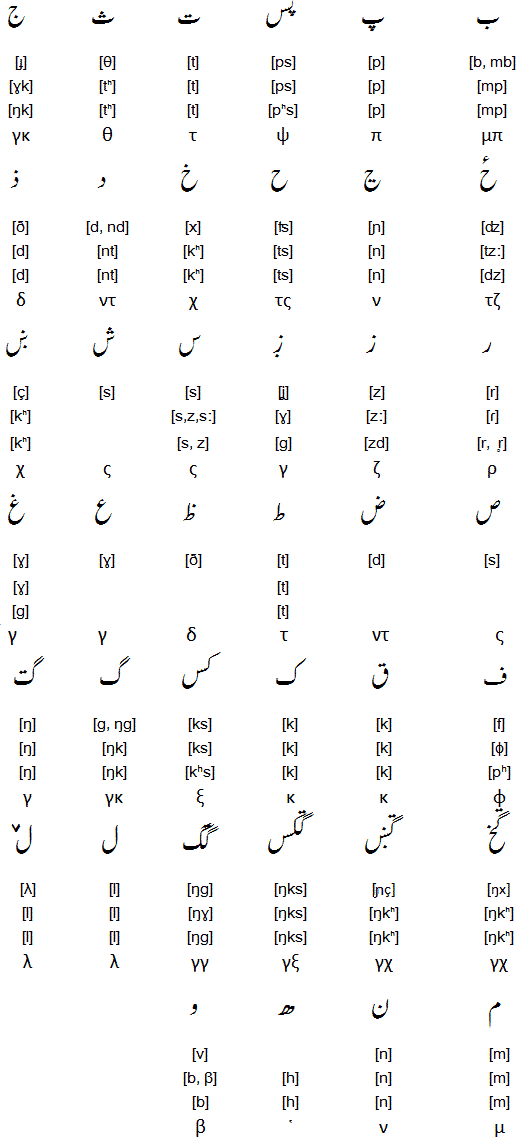
In this table the pronunciation of all consonants is given. The first row contains pronunciation in Modern Standard Greek. The second row contains pronunciation in Koine Greek. The third row contains classical pronunciation of Ancient Greek. The forth row contains corresponding Greek letters.
- If ب appears word-initially or after ر or ل then it is pronounced as [b] in Modern Greek. Otherwise it is pronounced as [m͡b]. Examples:
- بیڵارذُ = [biʎɐˑrðo] (biliárdho)
- اِبُذیزُمے = [em͡boðiˑzome] (embodhízome)
- If ج appears word-initially or after ر or ل then it is pronounced as [ɟ] in Modern Greek. Otherwise it is pronounced as [ɲɟ]. Examples:
- جۆنا = [ɟoˑnɐ] (Gióna)
- آجیذا = [ɐɲɟiˑðɐ] (angídha)
- If د appears word-initially or after ر or ل then it is pronounced as [d] in Modern Greek. Otherwise it is pronounced as [n͡d]. Examples:
- درُپی = [dropiˑ] (dropí)
- زۆدانُس = [zon͡danoˑs] (zondanós)
- If ر appears between vowels, then it is pronounced as [ɹ] in Modern Greek. If it appears after a consonant, it is pronounced as [r]. Otherwise it is pronounced as [ɾ]. Examples:
- سیڱخۆرۆ = [siŋxoɹoˑ] (sinkhoró)
- پرُس تا برُس = [pros tɐ bros] (pros ta bros)
- كُرڃیزا = [koɾɲiˑzɐ] (korníza)
- If ر appears in the beginning of word, it is pronounced as [r̥] in Ancient Greek. Otherwise it is pronounced as [r]. Examples:
- رینِڱښیٰتِۆ = [r̥ineŋkʰyteɔː] (rhinenchyteo)
- نِفریِسیس = [nepʰrɛːsis] (nephresis)
- If س appears before ب, ج, ځ, ڃ, د, ذ, ر, ز, ږ, ض, ظ, ع, غ, گ, ڱ, م, ن or و (followed by other vowel in case of last); even at word boundary; it is pronounced as [z]. Otherwise it is pronounced as [s]. Examples:
- پیراسمُس = [piɹɐzmoˑs] (pirasmós)
- اِپیستیمی = [epistiˑmi] (epistími)
- If ق or ك appears before ی or ے or is marked with kasrat, then they are pronounced as [c] in Modern Greek. Otherwise they are pronounced as [k]. Examples:
- خُكِی = [xoˑcei] (khókeï)
- آلِقُس = [ɐleˑkos] (Alékos)
- If گ appears word-initially or after ر or ل then it is pronounced as [g] in Modern Greek. Otherwise it is pronounced as [ŋ͡ɡ]. Examples:
- گرِمُس = [gremoˑs] (gremós)
- اِگرینۆ = [eŋ͡ɡriˑno] (engríno)
- If م appears before ف, then it is pronounced as [ɱ] in Modern Greek, otherwise it is pronounced as [m]. Examples:
- اِخۆ سیمفۆڃیسی = [exoˑ siɱfoɲiˑsi] (ekhó simfonísi)
- میرمیجی = [mirmiˑɲɟi] (mirmíngi)
- If ن appears before ث or ذ, then it is pronounced as [n̪] in Modern Greek. If it appears before س, it is pronounced as [n̠]. Otherwise it is pronounced as [n]. Examples:
- اِنذیافِرُن = [en̪ðʝɐfeˑɹon] (endhiaféron)
- كُنسِروا = [kon̠seˑrvɐ] (konsérva)
- برونځُس = [bruˑnʣos] (brúntzos)
- The letter ه is not used for writing Modern Greek, but appears in Old Greek mostly at word initial position (as هـ).
Vowels
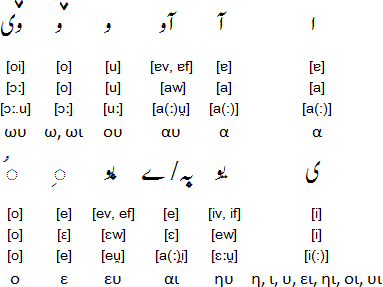
In this table, pronunciations of vowels are given with same convention as consonants. Above vowels and diacritics are enough for writing Modern Greek. With some added diacritics, Koine and Ancient Greek specific vowels could also be represented with minimal change in spelling.
- If ا appears word initially, then it marks that word start from vowel (either marked on it, or following it). At any other place, it represents vowel /a/. Word initial /a/ is marked by آ. Examples:
- اِغۆ = [eɣoˑ] (egó)
- اېوخاریستۆ = [efxɐɹistoˑ] (evkharistó)
- آن = [ɐn] (an)
- If ی appears after one of ب, ځ, ڃ, د, ذ, ر, ز, ض, ظ, ڱ or و and is followed by vowel, then it can be pronounced as [ʝ] in Modern Greek. Similarly, if it appears after م and before vowel, then it can be pronounced as [ɲ]. Similarly, if it appears after one of پ, ت, ځ, ح, س, ش, ص, ط or ف and is followed by vowel, then it can be pronounced as [ç]. Otherwise, it is generally pronounced as [i] even in above conditions. Examples:
- ذُدیۆن = [ðondʝoˑn] (dhondión)
- كالامیِس = [kɐlɐmɲeˑs] (kalamiés)
- خارتیئو = [xɐrtçuˑ] (khartiú)
- اِبُریُ = [emboˑɹio] (emborio)
Vowel Diacritics for Koine Greek
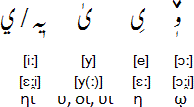
Here first line represents Koine pronunciations. Second line represents Ancient Greek pronunciations.
The vowel ηι in Koine and Ancient Greek is represented as ي, يٖـ, ـيٖـ and ـي in its isolated, initial medial and final positions respectively.
Vowel Diacritics for Ancient Greek

Following are some pronunciation rules for Ancient Greek diphthongs:
- If او is followed by a vowel, then it is pronounced as [a(ː)wː]. Otherwise, it is pronounced as [a(ː)u̯]. Examples:
- آذاوۆس = [adawːɔːs] (adauos)
- آغراولِۆ = [agrau̯leɔː] (agrauleo)
- If ۆٖ is followed by a vowel, then it is pronounced as [ɔːjː]. Otherwise, it is pronounced as [ɔːi̯]. Examples:
- اُلُفۆٖئُس = [olopʰɔːjːos] (olophoios)
- پلۆٖكُس = [plɔːi̯kos] (ploicos)
- If یُ is followed by a vowel, then it is pronounced as [ojː]. Otherwise, it is pronounced as [oi]. Examples:
- آمفیغڃیُا = [ampʰignojːa] (amphignoea)
- آمیُویِ = [amoibɛː] (amoebe)
- If یِو is followed by a vowel, then it is pronounced as [ɛːwː]. Otherwise, it is pronounced as [ɛːu̯]. Examples:
- كاتاپِپتیِویا = [katapeptɛːwːiːa] (catapepteuia)
- ڃیِوس = [nɛːu̯s] (neus)
- If ي is followed by a vowel, then it is pronounced as [ɛːjː]. Otherwise, it is pronounced as [ɛːi̯]. Examples:
- قاپاڃيٖاذیِس = [kapanɛːjːadɛːs] (Capaneiades)
- ڵيٖنُمُس = [lɛːi̯nomos] (leinomos)
- If ے is followed by a vowel, then it is pronounced as [a(ː)jː]. Otherwise, it is pronounced as [a(ː)i̯]. Examples:
- آفېاسے = [apʰajːaːsai̯] (aphaeasae)
- If ېو is followed by a vowel, then it is pronounced as [ewː]. Otherwise, it is pronounced as [eu̯]. Examples:
- آكاتاسكېواستُس = [akataskewːastos] (acatasceuastos)
- آلازُنېوما = [alazdoneu̯ma] (alazoneuma)
Sample texts
Sample Text for Modern Standard Greek

Standard Greek version
'Ολοι οι άνθρωποι γεννιούνται ελεύθεροι και ίσοι στην αξιοπρέπεια και τα δικαιώματα. Είναι προικισμένοι με λογική και συνείδηση, και οφείλουν να συμπεριφέρονται μεταξύ τους με πνεύμα αδελφοσύνης.
Transliteration
Óli i ánthropi yenniúnde elévtheri ke ísi stin axioprépia ke ta dhikeómata. Íne prikisméni me loyikí ke sinídhisi, ke ofílun na simberiféronde metaxí tus me pnévma adhelfosínis.
Translation
All human beings are born free and equal in dignity and rights. They
are endowed with reason and conscience and should act towards one another
in a spirit of brotherhood.
(Article 1 of the Universal Declaration of Human Rights)
Sample Text for Koine Greek

Original Text
ἄξιος εἶ, ὁ κύριος καὶ ὁ θεὸς ἡμῶν,
λαβεῖν τὴν δόξαν καὶ τὴν τιμὴν καὶ τὴν δύναμιν,
ὅτι σὺ ἔκτισας τὰ πάντα
καὶ διὰ τὸ θέλημά σου ἦσαν καὶ ἐκτίσθησαν.
Transliteration
axios i, ho cyrios cae ho theos hemon,
labin ten doxan cae ten timen cae ten dynamin,
hoti sy ectisas ta panta
cae dia to thelema su esan cae ectisthesan.
Translation
“Worthy are you, our Lord and God,
to receive glory and honor and power,
for you created all things,
and by your will they existed and were created.”
(Revelation 4:11)
Sample Text for Ancient Greek
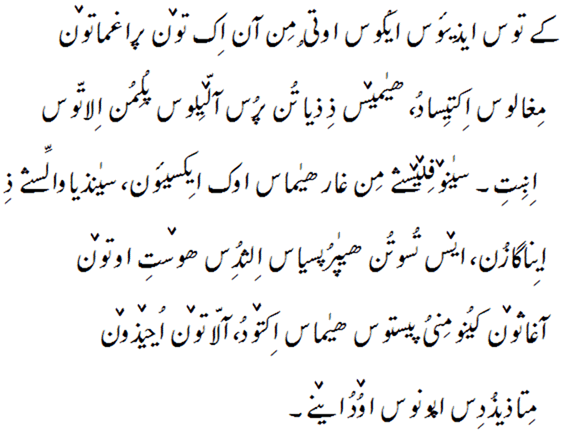
Original Text
καὶ τοὺς ἰδίους οἴκους οὗτοι μὲν ἂν ἐκ τῶν πραγμάτων μεγάλους ἐκτήσαντο, ὑμεῖς δὲ διὰ τὸν πρὸς ἀλλήλους πόλεμον ἐλάττους ἔχετε: συνωφελεῖσθαι μὲν γὰρ ὑμᾶς οὐκ ἠξίουν, συνδιαβάλλεσθαι δ᾽ ἠνάγκαζον, εἰς τοσοῦτον ὑπεροψίας ἐλθόντες ὥστε οὐ τῶν ἀγαθῶν κοινούμενοι πιστοὺς ὑμᾶς ἐκτῶντο, ἀλλὰ τῶν ὀνειδῶν μεταδιδόντες εὔνους ὤοντο εἶναι.
Transliteration
cae tus idius oecus utoe men an ec ton pragmaton megalus ectesanto, hymes de dia ton pros allelus polemon elattus echete: synophelesthae men gar hymas uc exiun, syndiaballesthae d' enancazon, es tosuton hyperopsias elthontes hoste u ton agathon coenumenoe pistus hymas ectonto, alla ton onedon metadidontes eunus oonto enae.
Translation
They have enlarged their private establishments by means of their public conduct, while you find yours reduced by your warfare against each other: for they did not permit you to share their advantages, though they compelled you to share their ill-fame; and they carried disdain so far that, instead of enlisting your fidelity by a communication of their benefits, they thought to ensure your sympathy by a partnership in their scandals.
(Lysias, Against Eratosthenes 12:93)
Adapated scripts by Mohammad Shakeb Baig
Arabic Greek,
Greek Arabic,
Latin Arabic,
Roman Rekhta
Other adaptations of alphabets
Information about Greek |
Phrases |
Numbers |
Family words |
Time |
Idioms |
Proverbs |
Tongue twisters |
Tower of Babel |
Articles |
Links |
Learning materials |
Books about the Greek alphabet
Constructed scripts for: Ainu |
Arabic |
Chinese languages |
Dutch |
English |
Hawaiian |
Hungarian |
Japanese |
Korean |
Lingala |
Malay & Indonesian |
Persian |
Tagalog / Filipino |
Russian |
Sanskrit |
Spanish |
Taino |
Turkish |
Vietnamese |
Welsh |
Other natural languages |
Colour-based scripts |
Tactile scripts |
Phonetic/universal scripts |
Constructed scripts for constructed languages |
Adaptations of existing alphabets |
Fictional alphabets |
Magical alphabets |
A-Z index |
How to submit a constructed script
[top]

You can support this site by Buying Me A Coffee, and if you like what you see on this page, you can use the buttons below to share it with people you know.

If you like this site and find it useful, you can support it by making a donation via PayPal or Patreon, or by contributing in other ways. Omniglot is how I make my living.
Note: all links on this site to Amazon.com , Amazon.co.uk
, Amazon.co.uk and Amazon.fr
and Amazon.fr are affiliate links. This means I earn a commission if you click on any of them and buy something. So by clicking on these links you can help to support this site.
are affiliate links. This means I earn a commission if you click on any of them and buy something. So by clicking on these links you can help to support this site.
[top]










, Amazon.co.uk
and Amazon.fr
are affiliate links. This means I earn a commission if you click on any of them and buy something. So by clicking on these links you can help to support this site.